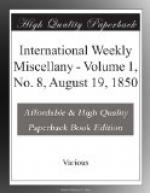The great Russian theatre of St. Petersburg has served for a model, and accordingly nothing has really been improved except that part of the performance which is farthest removed from genuine art, namely the ballet. That fact is that out of Paris the ballet is nowhere so splendid as in the great theater at Warsaw, not even at St. Petersburg, for the reason that the Russian is inferior to the Pole in physical beauty and grace. Heretofore the corps of the St. Petersburg ballet has twice been composed of Poles, but this arrangement has been abandoned as derogatory to the national honor. The sensual attractions of the ballet render it the most important thing in the theater. A great school for dancers has been established, where pupils may be found from three to eighteen years old. It is painful to see the little creatures, hardly weaned from their mothers’ breasts—twisted and tortured for the purposes of so doubtful an occupation as dancing. The school contains about two hundred pupils, all of whom occasionally appear together on the boards, in the ballet of Charis and Flora, for instance, when they receive a trifling compensation. For the rest the whole ballet corps are bound to daily practice.
The taste of the Russians has made prominent in the ballet exactly those peculiarities which are least to its credit. It must be pronounced exaggerated and lascivious. Aside from these faults, which may be overlooked as the custom of the country, we must admit that the dancing is uncommonly good.
The greater the care of the management for the ballet, the more injurious is its treatment of the drama. This is melancholy for the artists and especially those who have come to the imperial theater from the provinces, who are truly respectable and are equally good in comedy and tragedy. The former has been less shackled than the latter for the reason that it turns upon domestic life. But tragedy is most frightfully treated by the political censorship, so that a Polish poet can hardly expect to see his pieces performed on the stage of his native country. Hundreds of words and phrases such as freedom, avenging sword, slave, oppression, father-land, cannot be permitted and are stricken out. Accordingly nothing but the trumpery of mere penny-a-liners is brought forward, though this sometimes assumes an appearance of originality. These abortions remain on the stage only through the talent of the artists, the habit of the public to expect nothing beyond dullness and stupidity in the drama, and finally, the severe regulation which forbids any mark of disapprobation under pain of imprisonment. The best plays are translated from the French, but they are never the best of their kind. To please the Russians only those founded on civic life are chosen, and historical subjects are excluded. Princely personages are not allowed to be introduced on the stage, nor even high officers of state, such as ministers and generals. In former times the Emperor of China was once allowed to pass, but more recently the Bey of Tunis was struck out and converted into an African nobleman. A tragedy is inadmissible in any case, and should one be found with nothing objectionable but its name, it is called drama.




